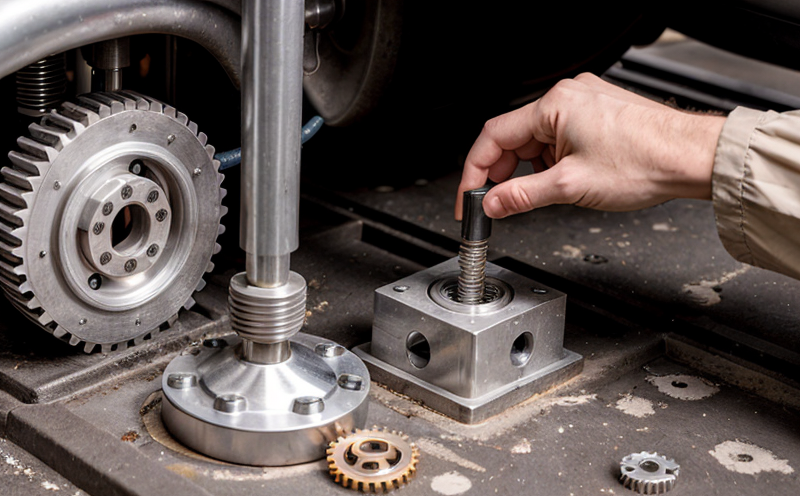ISO 6892-2 Elevated Temperature Tensile Testing of Metals
The ISO 6892-2 standard is a critical benchmark for the mechanical property testing of metals, especially when evaluating materials under elevated temperature conditions. This service ensures that manufacturers and quality assurance teams can verify the performance characteristics of metallic components in real-world operating environments. Elevated temperature tensile testing provides insights into how materials behave beyond their room temperature specifications, which is essential for industries like aerospace, automotive, and petrochemicals.
The test procedure involves subjecting a metal specimen to controlled stretching at elevated temperatures until it breaks. The results of this test are used to determine the material's yield strength, tensile strength, elongation, and reduction of area properties under these conditions. These metrics are crucial for understanding how metals will perform in high-temperature applications, such as engine components or structural parts.
The testing process follows stringent protocols outlined by ISO 6892-2, which ensures consistency and reliability across different laboratories. The use of advanced furnaces and tensile machines allows us to accurately simulate the conditions that materials will encounter in operational environments. This service is particularly valuable for materials like aluminum alloys, stainless steels, and titanium alloys, all of which are used extensively in high-performance applications.
Accurate testing under elevated temperatures helps manufacturers make informed decisions about material selection and design optimization. It also ensures compliance with international standards and regulatory requirements, thereby reducing the risk of product failure in critical sectors.
| Material Type | Temperature Range (°C) | Test Speed (mm/min) | Force Application (kN) |
|---|---|---|---|
| Aluminum Alloys | 200-450°C | 10 mm/min | Up to 30 kN |
| Stainless Steel | 200-600°C | 5 mm/min | Up to 100 kN |
| Titanium Alloys | 300-500°C | 20 mm/min | Up to 60 kN |
The test setup involves precise specimen preparation, where the sample is cut to the required dimensions and polished for accurate measurement. The specimens are then placed in a furnace that can be heated to the specified temperature range. Once the temperature stabilizes, tensile testing begins at a controlled rate.
For materials like aluminum alloys, the test involves careful consideration of the thermal expansion coefficient to ensure accurate measurements. In stainless steel and titanium alloy tests, the focus is on maintaining consistent heating rates to avoid premature failure due to uneven heat distribution.
The results from these tests are analyzed using advanced software that can extrapolate data for different temperature conditions. Reporting includes detailed graphs of force versus elongation, along with calculated mechanical properties at each tested temperature point. This comprehensive approach ensures that clients receive a thorough understanding of their materials' behavior under elevated temperatures.
Why It Matters
Elevated temperature tensile testing is essential for industries where the performance of metal components can significantly impact operational safety and efficiency. By simulating real-world conditions, this test helps ensure that materials meet stringent requirements set by international standards such as ISO 6892-2.
For aerospace manufacturers, understanding how metals behave at high temperatures is critical for designing aircraft engines that operate in extreme environments. Similarly, automotive companies rely on these tests to optimize the performance of components like exhaust systems and engine parts. In petrochemical applications, where materials are exposed to corrosive conditions and high temperatures, this testing ensures that piping and structural elements can withstand harsh operating conditions.
The reliability of elevated temperature tensile testing also plays a crucial role in ensuring regulatory compliance. Many industries have strict requirements for material performance at specific temperature ranges, and failure to meet these criteria can lead to product recalls or safety issues.
By investing in this service, clients gain access to cutting-edge facilities that provide precise and accurate data. This information is invaluable for R&D teams looking to innovate and improve existing materials. For quality assurance departments, the results from elevated temperature tensile testing offer a clear picture of material performance under stress, helping to reduce the risk of product failure.
Competitive Advantage and Market Impact
- Access to advanced furnace technology that ensures uniform heating rates across specimens.
- Precision in specimen preparation, ensuring accurate mechanical property measurements.
- Comprehensive reporting tools that provide detailed insights into material behavior under elevated temperatures.
- Compliance with international standards like ISO 6892-2, which enhances the credibility of test results.
The ability to conduct elevated temperature tensile testing provides a significant competitive advantage in the market. It allows companies to differentiate themselves by offering superior product quality and reliability. In industries where safety is paramount, such as aerospace and automotive, this service can be a deciding factor when selecting suppliers.
Moreover, compliance with international standards enhances client trust and ensures that products meet stringent regulatory requirements. This can lead to increased market share and better customer relationships. By leveraging the expertise of our testing facility, clients can stay ahead in their respective markets by ensuring that their materials perform reliably under challenging conditions.
Use Cases and Application Examples
| Industry Sector | Application Example | Elevated Temperature Range (°C) | Material Tested |
|---|---|---|---|
| Aerospace | Turbine blades for jet engines | 300-500°C | Inconel 718 |
| Automotive | Catalytic converters and exhaust systems | 400-600°C | Stainless Steel 304L |
| Petrochemicals | Pipeline components for offshore platforms | 250-450°C | Titanium Alloy |
The aerospace industry frequently utilizes elevated temperature tensile testing to evaluate the performance of turbine blades, which must withstand extreme temperatures during engine operation. In the automotive sector, catalytic converters and exhaust systems are tested under high temperatures to ensure durability and efficiency. The petrochemical industry relies on this service for pipeline components that operate in offshore platforms where materials must resist both temperature and corrosion.
These examples highlight the versatility of elevated temperature tensile testing across various industries. By providing accurate data, this service helps manufacturers make informed decisions about material selection and design optimization, ultimately leading to safer and more reliable products.





